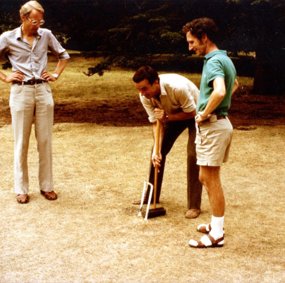Decided authorship-order by croquet
An article in The Journal of Animal Ecology from 1974 has an unusual footnote: «The order of authorship was determined from a twenty-five-game croquet series held at Imperial College Field Station during summer 1973.»


About half an hour's drive southwest of London, is Silwood park. The main building, a stately brick house from the 1870s, was purchased by London Imperial College in 1947, along with large, green fields. The school established laboratories, meteorological measuring stations and a nuclear research reactor. Silwood park attracted researchers in ecology, evolution, and conservation.
One of them, Michael P. Hassell, was hired as a lecturer in 1970. He soon became involved in research on insect ecology.
«The Imperial College Field Station at Silwood Park was a world-leading centre for the study of population ecology. The group was led by the late Sir Richard Southwood,» Hassell explains.
In 1971, Australian Robert (Bob) Mcredie May visited Silwood Park. The famous theoretical physicist was interested in ecology.
«A wonderful collaboration»
«That started a wonderful collaboration on the population dynamics of host-parasite and predator-prey interactions», Hassell recollects.
In addition to common professional interests, May and Hassell shared a passion for croquet. They enjoyed the game's physical and strategic challenges ‒ every hit counts, every ball must be deployed in the best manner.
As they plan a scientific paper, Hassell and May begin talking about order of authorship: Which of them should have their name first? They agreed that the contribution was fairly equal and thus Hassel came up with an untraditional idea: How about deciding the order through a croquet competition? They agree on a 25-game series of one game each lunchtime during the summer 1973. The winner will be named first in the article.
The Battle among rabbit scrapes
«The croquet pitch at Silwood was very informal and idiosyncratic. There were lots of rabbits at Silwood that made minor excavations in places and one of the tricks was to try and get one of one’s opponent’s balls into one of these rabbit scrapes,» Hassell recalls.
The «rivals» met at lunchtime whenever it was not raining. After a quick bite, they entered the croquet pitch wearing their informal work clothes. A game was normally over within an hour and was generally watched by some of Hassel’s and May’s colleagues.
«As the series wore on through the summer, it gathered more interest as everyone knew that we were playing for order of authorship on a significant piece of work,» Hassell recollects.
According to Hassel, Bob May was a very charismatic and engaging person. The battle escalated towards the end of the series:
«As I recollect, it got quite tense towards the end of the series because the tally of games was fairly equal. I had started to build up a good lead in the number of games, but then Bob (who was very competitive as a person) started to catch up. In the end, I think the tally was very close, maybe 13 to 12!»
Footnote removed
The result appears in the article Aggregation of Predators and Insect Parasites and its Effect on Stability. «By MP Hassell and RM May*», it says, with the following footnote: «*The order of authorship was determined from a twenty-five-game croquet series held at Imperial College Field Station during summer 1973.»
The journal did, however, try to remove the footnote.
«When we were finally sent the proofs, we were dismayed that the footnote had been removed. Being young and full of ourselves, we just insisted that it be put back and the editors agreed, presumably because they were quite keen to have the paper in the Journal,» Hassell explains.
According to him, croquet remained a popular sport at Silwood, at least up to his departure in 2007. By then, he had worked as a professor, dean, and head of the Faculty of Life Sciences for a number of years. May, later known as Baron May of Oxford, received several professorships, became a scientific adviser to the British government and president of The Royal Society. He died last year.
Today, Professor Hassell can understand that the famous authorship agreement may appear frivolous. It was a different time:
«Nowadays there is a lot more pressure on authorship, citations etc. At that time, we just saw it as great fun and just happy to be collaborating without caring too much about authorship.»
Sources: Journal of Animal Ecology (vol. 43, No. 2, 1974); Imperial College Silwood Park Documentary – 1982 på YouTube; www.imperial.ac.uk; Wikipedia
More on unusual ways to settle authorship order?
https://dynamicecology.wordpress.com/2016/09/21/fun-ways-of-deciding-authorship-order/